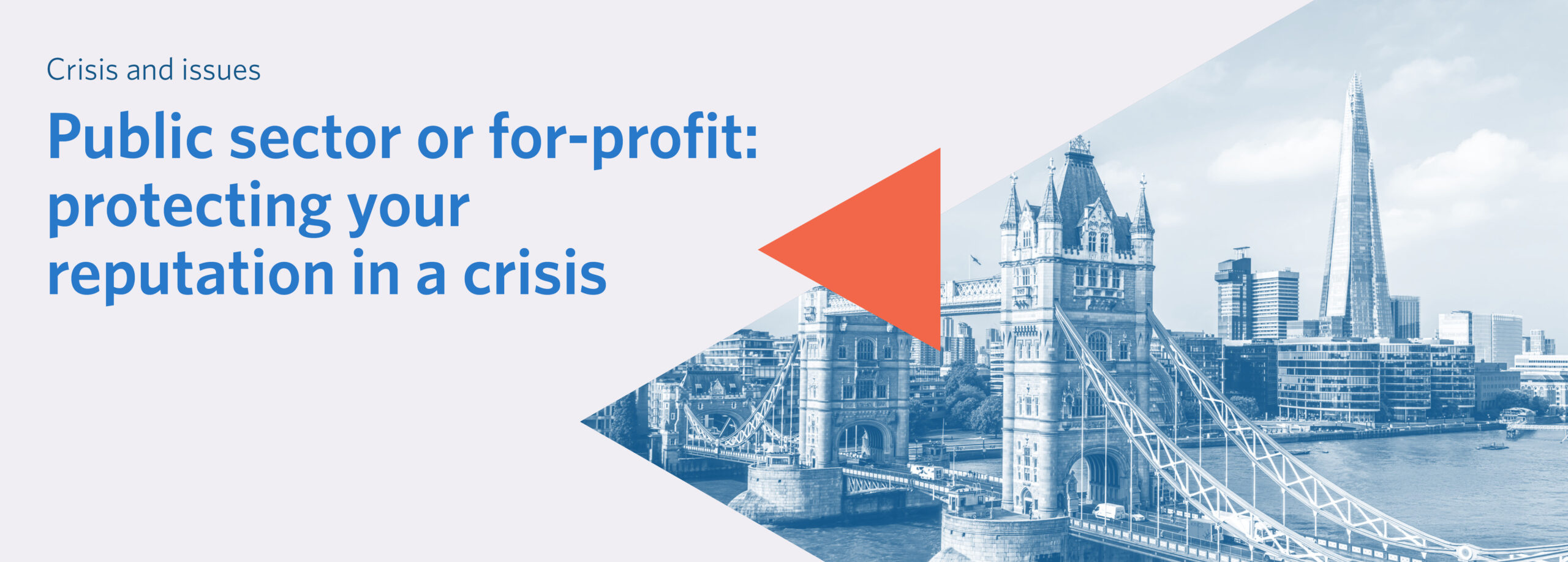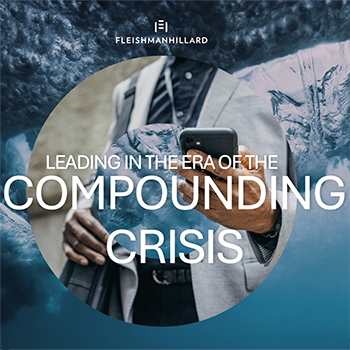Public sector or for-profit: protecting your reputation in a crisis

 Having worked both in-house in the public sector and for agencies representing for-profit companies, there are some very real, important differences to consider when it comes to managing reputation – and some key principles that apply to both too.
Having worked both in-house in the public sector and for agencies representing for-profit companies, there are some very real, important differences to consider when it comes to managing reputation – and some key principles that apply to both too.
Crises across both for-profit companies and the public sector are responded to best when you have senior representation from all relevant functions of the organisation, led by someone at the top who can be held accountable on the decisions they make. The lack of a senior authoritative figure often leads to a worse response regardless of the crisis, sector or industry. To ensure senior leaders are well-practised in internal processes and how they will work together and speak with one voice in times of turmoil, organisations should regularly test their crisis response through simulations and table-top exercises.
Media often feel they have more right to know the details when it comes to public sector organisations, citing ‘doing their public duty’ whereas this can be a stretch to claim for private sector companies. This can mean we see a greater or earlier need for a public facing spokesperson in public sector organisations, when the same crisis may not meet that need for a for-profit business. For both though, having a good number of senior, media trained and rehearsed spokespeople who can step up if needed leaves options open.
Crises for for-profit businesses are not always of interest to the wider public, whereas the public sector face a demand from society of “I pay my taxes, so I have a right to know”. For them, there is a higher expectation from stakeholders of being told more and sooner, and it is likely they will want to keep to a consistent message for all audiences. Understanding how your values guide your messaging and communications approach in a time of crisis and thinking about this in advance can save precious time and unnecessary internal debate when the chips are down. For-profit companies, where the situation doesn’t force it, can opt to tell their stakeholders at a slightly later time when they know more about the issue and have more established messaging for the issue at hand and any potential developments. That said, a dissatisfied, business-critical customer of a for-profit company can be just as demanding as the wider public and carry the same amount of power. To address all of these challenges, it is important to know in advance what stakeholders you would prioritise in a crisis and who holds those relationships.
Key for all organisations is to the need to avoid a ‘lack of response’ becoming the story. Not providing information when it is needed, leaving your audiences confused, and not providing suitable support in response to an issue, will damage your reputation further and leave you looking disorganised and not in control.
So how can you do that? Organisations who are for-profit and those in the public sector both need to invest the time in identifying and understanding their key risks so they can be as prepared as possible should they arise. Knowing, and practising, how you would manage a specific issue can help expediate your real-time response which will help avoid a vacuum of information being filled by others and ensure your communications in a crisis are sufficiently timely.
At FleishmanHillard, we have a wealth of experience in helping all types of organisations prepare for, respond to, and recover from reputationally challenging issues and crises. From carrying out extensive risk identification exercises to creating communications materials and templates, and stress-testing your processes. Get in touch with us at the beginning of your journey so you can be in the best place possible when something adverse comes up. If that’s looking like a probability more than a possibility, let us help you navigate any current issues with our expert crisis communications counsel, full-service press office, and real time media/social media monitoring.
Ella Cahoon, Senior Account Director, Crisis & Issues at FleishmanHillard London.
We’re here to help! You can reach us at [email protected].
Find Out More
-
Corporate Affairs Trends for 2026
December 10, 2025
-
Leading in the era of the compounding crisis
October 2, 2025


